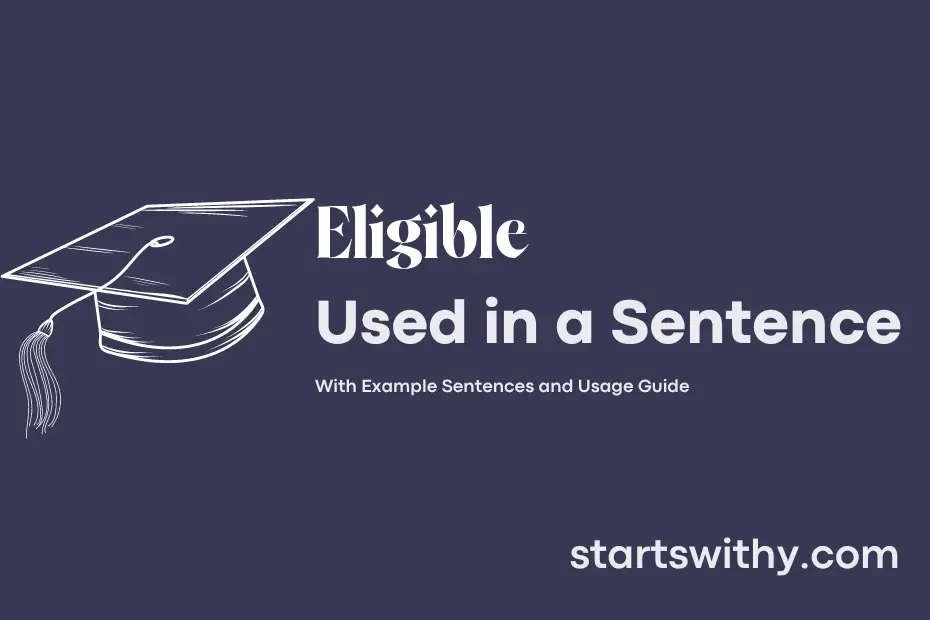Are you wondering what it means to be “eligible”? In simplest terms, being eligible indicates meeting the necessary conditions or requirements to qualify for a particular benefit, program, or opportunity.
Being eligible often involves satisfying specific criteria set forth by an organization, institution, or authority. This can encompass a variety of factors such as age, income level, previous experience, or other pre-determined qualifications.
7 Examples Of Eligible Used In a Sentence For Kids
- You are eligible to join the school choir if you love to sing.
- If you are five years old, you are eligible to join kindergarten.
- Students who eat their vegetables are eligible for a special prize.
- Everyone who finishes their homework is eligible for a sticker.
- If you are a good listener, you are eligible for a class leader position.
- Those who help their friends are eligible for a kindness award.
- If you follow the rules, you are eligible to participate in the school play.
14 Sentences with Eligible Examples
- Eligible students can apply for scholarships based on their academic performance.
- The top 10% of the class will be eligible for the Dean’s List recognition.
- Students who meet the criteria set by the university will be considered eligible for internships.
- To be eligible for campus housing, students must submit their applications before the deadline.
- Only eligible students can participate in the study abroad program.
- Students must maintain a certain GPA to remain eligible for financial aid.
- Seniors who have completed all their credits are eligible to graduate.
- Freshmen are not eligible to apply for certain advanced courses until their second year.
- Students with outstanding academic records are eligible for prestigious awards.
- Extra-curricular activities can make students more eligible for leadership positions on campus.
- Sophomores are eligible to apply for research assistant positions in various departments.
- Students who are eligible for on-campus jobs can earn extra income while studying.
- Summer internships are available for eligible students who want to gain practical experience.
- Graduating students who meet the requirements are eligible to attend the commencement ceremony.
How To Use Eligible in Sentences?
To use “Eligible” in a sentence, you can follow these simple steps:
-
Understand the meaning: First, it’s important to know that “Eligible” means being qualified or meeting the requirements for something.
-
Identify the context: Determine the situation where you want to use the word “eligible.” It could be related to eligibility for a job, a scholarship, a competition, or any other opportunity.
-
Construct a sentence: Once you know the context, create a sentence that clearly shows someone’s eligibility. For example, “She is eligible for the scholarship due to her outstanding academic performance.”
-
Pay attention to grammar: Make sure the sentence is grammatically correct and makes sense. Use “eligible” in a way that fits the structure of your sentence.
-
Practice using the word: To become more comfortable with using “eligible,” try incorporating it into different sentences. This will help you become more familiar with the word and how to use it effectively.
Remember, using “eligible” correctly in a sentence can help you communicate effectively and convey the message clearly. By following these steps and practicing, you can improve your usage of the word in various contexts.
Conclusion
In conclusion, the examples provided showcase how the concept of “eligible” is used in various sentences to indicate someone or something that meets the necessary criteria or requirements. Whether it’s referring to individuals who qualify for a specific opportunity, like being eligible for a scholarship or promotion, or items that satisfy a certain condition, such as being eligible for a discount or warranty, the term is consistently used to denote eligibility or suitability.
Understanding the term “eligible” is essential in determining who or what is appropriate or qualified for a particular situation. By recognizing the criteria needed to be met, individuals can confidently identify those who are eligible for specific benefits, privileges, or opportunities, ensuring fairness and clarity in decision-making processes.



